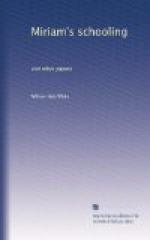“What should we say,” observed the superintendent of the Dissenting Sunday-school one day to one of his classes, having Fitchew in his mind, “of a man who, if he was on a voyage in a ship commanded by a captain with a knowledge of navigation, should refuse in a storm to obey orders, affirming that they were all of no use, and should betake himself to his own little raft?”
Curiously enough, the Sunday before, the vicar, having the Dissenter in his mind, had said just the same of “unlettered schismatics,” as he called them.
Fitchew always had one argument for those friends who strove to convert him. “I don’t see as them that goes to church are any better than them as don’t. What’s he know about it?” meaning the parson or the minister, as the case might be.
Fitchew was very rough and coarse, and rather grasping in his dealings with those who employed him, not so much because he was naturally mean, but because he was always determined that well-dressed folk should not “put on him.” Nevertheless, he was in his way sympathetic and even tender, particularly to those persons who suffered as he did, for he was afflicted with a kind of nervous dyspepsia, not infrequent even amongst the poor, and it kept him awake at night and gave him the “horrors.”
“Well, Fitchew, are you any better?” said Miriam.
“Bad just now. Ain’t had no regular sleep for a fortnight. Last night it was awful. I kicked about and sat up; the noise in my ears was something, I can tell you; and then the wind in me! It’s my belief that that there noise in my ears is the wind a coming out through them. I couldn’t stand it any longer, and I got up and walked up and down the road. Would you believe it, the missus never stirred; there she lay like a stone, and when I came in she says to me, ’Wot’s the matter with you?’ That’s just like her. She goes to bed, turns round, and never knows nothing of anything till the morning. I could, have druv my head agin the door-post.”




